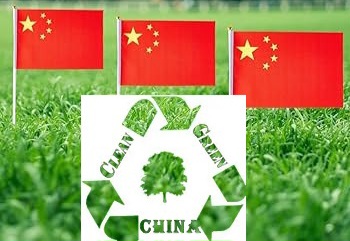China’s Green Development for Humanity Through Climate Change Policies

Humankind is grappled with the challenges of climate change, impacting the Sustainable development in the world. Climate change is a common problem for whole globe and China is one of those nations which is continuously tackling the climatic crisis. China is implementing thoroughly and faithfully climatic policies for reducing climatic risks and promoting green and clean development for harmony between nature and humanity.
Over the past years, China has implemented several environmental friendly economic and social development projects under the guidance of President Xi Jinping. President Xi Jinping’s thoughts and policies through establishment of high-quality development philosophy are actively promoting Ecological civilization.
In response to these climatic changes China had prioritized and adopted effective measures to reduce carbon emissions and mitigate its effects through promotion of environment friendly and green development.
The objective of this article is to present the legislative measures and policies implemented by China to address climate change, along with its proactive engagement in global governance initiatives in response to the challenges posed by climatic changes.
China’s Efforts for Improvement and Support of Climate Policies:
China is actively improving and supporting climate change policies through effective legislation, formulation of standards, Economic and development policies, personal training, technological innovation, carbon market development, and national green and low carbon actions. Adoption of these measures are stimulating positive results in mitigation of climatic change.
a. Legislation and Formulation of Standards:
China has accelerated the legal framework by amending the Environmental laws and regulations in response to climate changes. China has revised and issued new Laws and guidelines for industrial parks for effective assessments and evaluation of measures required for the reduction of pollution and carbon emissions. Advance and effective provisional and local administrations carbon control laws were introduced to further support and improve the national carbon market legislation.
China has further introduced the new norms and standards systems to enhance the existing standards to control the substances responsible for the Ozone layer depletion. Moreover, China has approved 229 carbon-emission related standardized substances, two carbon-emission related benchmarks and 57 carbon-emissions related measurement standards. Laws and standards are also approved in various fields like ecological conservation and restoration, energy conversation and new high-quality farmland standards.
b. Economic Policies:
Since 2021, China has adopted several new economic policies to promote green and clean development. Through development of green finance china is providing incentives and loans to industries and institution for carbon reduction technologies and conservation of environment. China has lent CNY 85.5 billion to industries for carbon reduction facilities and more than CNY 145 billion through carbon reduction loans. In result of these policies carbon emissions reduced by 28.76 million metric tonnes on annually basis.
China has also improved the fiscal and taxation policies through implementation of fixed electricity prices policy for renewable energy generation, and financial support policy for new energy vehicles etc.
Several Preferential Tax policies have been imposed to prevent environment deterioration and support environment friendly development, which are as below;
- Income tax will be reduced or exempted for those organisation and industries qualified in environmental protection, water and energy conservations.
- 15% of income tax exemption will be provided to those third- party enterprises involved in prevention or pollution control.
- Vehicle and ships purchase tax will be exempted on new energy vehicles and ships.
- Ecological protection and environment friendly industries will get full Value added tax refunds on monthly basis.
c. Support and Research for Scientific Technological Innovation:
China has carried out various technological advancement and innovation projects for zero carbon, low carbon and negative carbon. The focus of these projects are mainly in research and development of carbon reduction technologies in energy, transportation, construction, and industry. China has also initiated several technological projects like solar energy technology projects and Research and development technologies for carbon neutrality.
Further industries under these initiatives are encouraged to boost more innovative technologies like hydrogen-rich fuel engine, carbon reduction photocatalysts, solar energy technology and application of these integrated system technologies.
China has started several monitoring and evaluation technologies to efficiently monitor the carbon emissions and their neutrality. Additionally, promotion of development and application of green technologies for vehicles, inland ships, hybrid aircrafts and electric transportation vehicles are also part of green technological advancement initiative.
d. Environment Awareness Campaigns in Society:
Government of China has initiated several mass campaigns to spread awareness in the society about carbon emissions neutrality and environment protection. Multiple events like National Low-carbon week, National Energy Conservation week, World Environmental day, World meteorological day, Meteorological, Science and technology week and National Science Popularization days are celebrated to raise awareness and disseminating knowledge about Climate change.
In response to environment friendly policies, many State-owned enterprises in various fields like transportation, construction, petroleum, and telecommunication has issued their statements for adopting green and low carbon technologies.
China initiated campaigns like ‘‘Being a Contributor to Beautiful China’’ to provide knowledge about environmental protection and encourage society to actively participate in developing ecological civilization. ‘‘Green family’’ campaigns are also launched for women and families to actively play their role in environment protection through adoption of green and low-carbon lifestyles.
China’s Participation for Climate Change at Global level:
Like national climate change policies China is actively involved in global cooperation on climate change. China plays crucial role in green and clean development through bi-lateral and multi-lateral negotiations, additionally promoting South-South cooperation and green development projects in world through Belt and Road Initiative (BRI). China is building a global governance system for climate change by putting forward global development proposals for win-win outcomes.
Climate Change is the top priority of President Xi Jinping’s diplomatic policies. In 2021, for the first time China has put concept of ‘‘For Man and Nature; Building a Community for life together’’ to present China’s proposals for global and climate governance. Additionally, China has put forward ‘‘1+N’’ Policy framework to place policies and measures for carbon peaking and neutrality.
In order to effectively address climate challenges, China has hosted and participated in several global climate and environmental protection forums like China-EU carbon emission Dialogue, BRICS high level Climate Change meeting, G20 Energy and Climate Change Conference and Addressing Climate Change on World Economic Forum. China has been actively collaborating with various organizations and countries like ASEAN, Germany, South Korea, Singapore, Uruguay, United Kingdom, Finland, Denmark and European Union in fields such as green and low carbon technology, green energy, and renewable energy. In support of global environmental efforts, China has contributed over $31.2 million to the Global Environment Facility and $10 billion under the Paris Agreement specifically for the advancement of climate finance in developing nations.
What has China Achieved through Climate Change Policies:
In December 2023, China Ministry of Ecology and Environment (MEE) released a report on China’s achievements through accomplishment of efficient climate change policies. China’s promotion and implementation of successful climate change policies has yielded fruitful results.
Some of these outcomes are discussed as below;
- In order to promote green energy development, China has become one of the leading supplier of solar power and wind turbines energy equipment, helping developing countries to produce clean and green energy at very low cost.
- In China production of clean and green energy reached about 1213GW till 2022, promoting low carbon and green energy.
- China remains number 1 producer and supplier of new energy vehicles in the globe for consecutive eight years, with reaching 16.2 million new energy vehicles nationwide.
- China has signed more than 46 MOUs on climate change with 39 developing countries and launched 70 climate change mitigation projects, trained more than 2300 technicians and officials of more than 120 nations.
- Under the framework of Belt and Road Initiative (BRI) China is promoting green development projects in various BRI partner nations to enhance their abilities to deal with climate change.
- In first half of 2023, more than 56% of Chinese investment in BRI nations went into production of renewable energy projects like solar, wind and hydropower projects.
- During the period of 2005 to 2022, China’s carbon emissions per unit of GDP has declined up to 51%.
- As of 2022, non-fossil fuel energy consumption contribution reached up to 17.55% in total energy consumption.
- The rate of deforestation in China has decreased, leading to a growth in the country’s total forest coverage, which reached 21.02% by the year 2021.
Conclusion:
China is actively playing a constructive role in addressing the challenges of climate change by actively participating and cooperating on global scale. The nation has modernized its climate change policies by enacting legislation and establishing standards in industrial production. Additionally, China has implemented preferential tax policies to incentivize industries and enterprises to embrace modern, low-carbon technologies. To raise environmental awareness, various initiatives, such as the Green Family campaigns targeting women and families, have been introduced to encourage the adoption of low-carbon and green lifestyles.
China is undergoing a significant shift in its energy production, transitioning from old fossil fuels to new, cleaner, and greener energy sources.
China’s commendable efforts on the global stage for climate change are noteworthy. The nation actively participating and promoting global climate events. Through the Belt and Road Initiative (BRI), China is tangibly investing in clean energy projects across various BRI partner nations. China’s dedication goes beyond merely reducing global carbon emissions and pollution; it also involves a steadfast commitment to safeguarding a hospitable environment for humanity.


